Text
did anyone make a gif of knuckles eating grapes yet i need it
6 notes
·
View notes
Text
i read everyone on the moon is essential personnel and made this. enjoy.
25 notes
·
View notes
Text
made a uquiz
30K notes
·
View notes
Note
for what it's worth. i didn't notice anything that suggests zelda forgets
fuck. i have been lied to. ok guys this is it post over can’t have shit with this fucking game
1 note
·
View note
Text

Awaken her power
808 notes
·
View notes
Text
apparently in totk’s ending zelda forgets everything (i haven’t actually finished the game lol) so i’m headcanoning that she actually remembers it all she just lied bc that shit was EMBARRASSINGGG
22 notes
·
View notes
Text
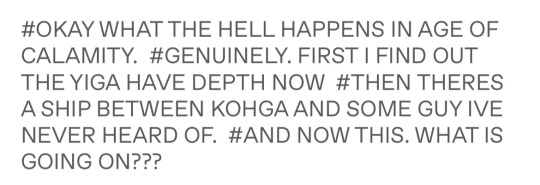
@your-local-ruebit-hole-detective ok i’m sorry but. i will answer your question.
age of calamity advertises itself as a prequel but in reality it’s a fix-it au with slight differences and writing that’s pretty bad but i have grown to appreciate it for how insane it goes sometimes.
the actual plot is that as a child zelda used to have a little egg-like guardian robot that she was forced to leave behind as she grew up due to her father’s pressure etc, and when the calamity happened this little robot saw it and traveled back in time with the goal to prevent this and protect zelda, creating a branching off timeline. there’s also an extra villain who is this prophet (???? this games writing isn’t good enough for me to tell you what his deal is exactly) who worships ganon and for most of the game works with the yiga to bring him back, except he’s more insane than them and works directly with malice and also sucks at his job because when he finally gets to ganon he unceremoniously dies and everybody’s like “yeah we have no idea what this guys deal was”.
the one significant change that doesnt have to do anything with time travel shenanigans is the fact that link doesn’t find the master sword as a child, but instead gets appointed zelda’s bodyguard for his genuine skill and then finds the master sword during one of the in game missions. despite this, revali still hates him, and often times when justifying this revali cites reasons that are literal complete opposites of how his grudge was characterised in botw, cementing revali’s characterisation as just a cunt for no reason. it’s great.
the significant time travel related change is that when all the champions go into their divine beasts and fight the blights a portal opens and the new champions (teba, sidon, riju, yunobo) get teleported in and help defeat the blights. zelda also doesn’t get her power by protecting link from a bunch of guardians, the scene still hits the same beats of link fighting things off so zelda can run away except in this game how it happens is that the insane prophet shows up and literally summons all the blights against link which makes the scene ten times more insane.
throughout the game the yiga show up regularly, often times with master kohga himself showing up and being the overall goofy guy he is, except he also has a hunk of a body guard who’s name i genuinely can’t recall. multiple times in the game kohga gets defeated and said hunk of a body guard throws him over his shoulder says “it’s not over yet” and walks off carrying kohga like a sac of potatoes.
in the original game, when shit starts hitting the fan the yiga stop showing up as enemies and at some point in the story kohga shows up without said hunk of a body guard, says “the prophet is insane and the calamity actually isn’t a good thing as we’ve discovered”, highly implies that the reason for his change of heart is because said prophet killed his hunk of a body guard (who literally. doesn’t show up again for the rest of the game mind you. he legit died), and is like “yeah the yiga will help you. after this whole thing is over we’ll go back to being bitches to you but rn let’s just kill this ganon guy and then walk our separate ways”. the fact that the calamity being a bad thing throws the yiga’s whole ideology and purpose into question is never addressed.
the dlc makes the death scene explicit, also making it a parallel to zelink by, again, making the bodyguard fight all the fucking blights so that kohga can escape. the scene literally opens with the body guard limping as they try to escape. it’s so much a parallel to zelink it’s insane. im afraid do not know what the hell they were cooking.
some other choice moments from this game that go insanely hard for no reason:
1. the first portion of the game is dedicated to zelda recruiting all the champions, and when it comes to recruiting revali he for some reason assumes it’s an attack, and sends all the rito soldiers to fight the intruders off. the rito do not question fighting some random hylians one of whom is literally zelda. the mission ends with a boss fight of link vs revali, which only ends without them killing each other because zelda runs in and goes “stop???? the fuck ????”
2. the entire game has cute bonding moments with the botw champions meeting their idols and getting to spend time with them. that is, except for sidon, who spends the game saving his older sister in a parallel universe which he has to leave by the end of the game, meaning every scene involving him has him on the brink of eleven hundred simultaneous mental breakdowns. the dlc adds a scene where the little sidon who is native to said parallel universe gets to interact with botw sidon, and botw sidon tells him that he’s going to grow up big and strong and will protect his sister, and the entire time he tries really hard to not acknowledge the fact that they are the same person, and that mipha is his sister too, presumably because nobody wanted to animate sidon ugly crying. in that scene you can literally see his soul die in his eyes it’s great
3. the dlc features tulin, god knows why. i don’t know how he got there or what he’s doing. he’s just there.
4. you can make noble pursuits in the game and drink them before missions for a buff. pre-gaming defeating the calamity is a thing, i cannot stress how much it is a thing in this game.
5. there are two separate animated cutscenes where link eats rocks on screen. only one of them involves the gorons, the other is a scene where link is being discussed and as the characters talk about how great he is in battle the camera pans to him eating rocks, seemingly on a dare from the other soldiers, who all surround him and are immensely excited by the fact that he is actually eating rocks.
6. the dlc features a scene where zelda gets to cook. link is horrified the entire time. she does not belong in the kitchen. she belongs anywhere outside the kitchen. the dlc also gives her the master cycle as a weapon. she commits vehicular manslaughter
7. the king gets a redemption arc, where he apologises to zelda only after she unlocks her power. the reason he realized he was wrong was because a sheikah relic that he confiscated from zelda turned out to be an ancient shield and it saved his life from a guardian blast. his apology is literal dog shit and right after it the game forces you to play as him for a mission. it almost made me rage quit.
8. thunder blight has an attack where it just swings its hair at you
9. when you finally fight calamity ganon he doesn’t have the form of the spider ganon from botw or even the boar, he is instead a buff guy made out of malice. literally just the shape of a buff non descript guy made out of malice. his boss fight is endless and the entire time you’re just beating the shit out of a non descript buff guy shape with a stick.
10. there’s a cute little side mission called something like “girls beauty contest” (in reality they all beat the shit out of each other for the title), where you’re only allowed to select female characters. that is, female characters AND gorons. think of that what you will
152 notes
·
View notes
Text
age of calamity dlc is so insane bc they reveal the yiga yaoi is problematic bc they met when one was a small child and the other took him under his wing and in the same cutscene proceed to follow this information with a zelink parallel. like they literally recreate the moment where link is about to sacrifice himself by fighting so that zelda can escape and even with the same fucking enemies they have in this game for that moment. who in the hell wrote “zelda master kohga parallels” in the script and more importantly who the hell looked at that and said “yeah that tracks”
#for the record this is all lighthearted i don’t particularly care abt this ship discourse#it’s just insanely funny that they did that#botw#legend of zelda#loz#breath of the wild#hyrule warriors#age of calamity#hw aoc#master kohga
38 notes
·
View notes
Text
sorry to bring up totk discourse like a literal year after the game came out and even more sorry for doing it in the format of a question that was posed directly to me again almost a year ago and has been ignored up until now (i’m pretty sure. i’m pretty sure i didn’t respond at the time. my memory in regards to this post is hazy and overridden by memories of the multiple people with poor comprehension congregating in my notes my apologies).
anyway, i did see and think about this question at the time, i just didn’t find the proper words to address it and now that i’ve had some distance from the game and the community i will try to collect my thoughts.
i really do not want to say “it’s not that deep”, because i feel that’s often times a thought terminating cliche when it comes to media analysis, but i’ve seen a lot of people at the time bring this up in the context of sidon to go “omg nintendo deliberately gave him a fiancée in order to discourage people shipping sidon and link”, and that just feels like a conspiracy theory that stems from people being so deep in their little fandom shipping circles to gauge how both the source material presents these characters and the average person views them.
i don’t think totk made any deliberate moves to “de-queer” botw. link is arguably even more gender non-conforming in totk, with all the jewellery and practically skirts you can wear, and the one hat that literally puts him in makeup. i’d argue totk is more favorable in its depiction of link’s gender nonconformity, even, since all the feminine outfit options in botw are accessed through the stipulation that link is pretending to be a girl, while totk doesn’t essentialize his identity in this way - link has the option to wear makeup not as a means to an end, not as a way to be perceived as more passing as a girl, but just because it’s fashionable. neutrality in these things is better than plot contrivances that try to make the narrative still uphold the gender binary, imo.
in terms of sidon - the reality is the way he acts with link in botw is not all that different from how he acts with link in totk. frankly i think if sidon was introduced with a female love interest from the get go it wouldn’t change anybody’s perception of how gay they are or are not for each other. most of the backlash against yona was pretty blatantly the typical fandom misogyny of “woman gets in the way of our gay ship, we hate her” which happens in many fandoms, regardless of when the love interest is introduced.
that being said, do i think totk is more heteronormative? to an extent, yes. i mean, you only have to look at zelda and the way she is pushed into the perfect maiden role, a role she struggled heavily against in botw. she was complex and burdened in botw, and in totk they just characterise her as the perfect bland girl who’s only motivation is to help the male main character.
the thing about husbands and marriages - i don’t actually think it’s all that different from botw. i mean, botw had the whole gerudo how to talk to men class already. the misogyny with the gerudo was always there, i made a post about it some time ago that i can’t be assed to find right now. a lot of what was in totk was simply the writers continuing the plot threads in botw without really thinking about whether it’s compelling or even narratively justified. the big ones are hudson and his little family drama, and, well, sidon.
sidon is an interesting case because this progression for him is just natural from the perspective of someone writing the progression of a prince without questioning royalty or the heteronormative status quo. the appeal of totk as a direct sequel is seeing what all of our beloved characters are up to now: notably, all the second gen champions from botw have been upgraded to a higher status of authority. yunobo is a chief now, so is teba, riju was already a chief but she reasserts her authority as a more powerful and well rounded chief now (her main quest is about being able to command her forces to protect her town, after all). and sidon becomes king. and what does he need, in order to assure the player that he will continue the royal line and progress the passing of authority established in his kingdom? well, a queen.
the way totk progresses established characters is by placing them into the position to continue cycles of power. botw’s regional quests were focused on the champions - so the regional characters were defined by their relationship with the champions, specifically the different ways in which they idolise them. teba admires revali as an aspiration because of his skill, sidon admires mipha as an older sister, riju admires urbosa as the perfect example of the expectations she is expected to and is struggling to fill, yunobo admires daruk as someone who was able to utilise the powers they both posses in order to protect others instead of just be fearful. but totk isn’t about champions. it’s about rulers.
in botw, the champions are a posse of exceptional warriors that are ultimately under the authority of the king, they were scouted for their skill, and only two of them are active leaders. in totk, the sages are explicitly stated to be the rulers of the four races, plus zelda - the ruler of the current hyrule. and, since the sages are straight up not characters in totk, and nobody is properly aware of them before the events of totk, there’s no relationship to be had with them. there’s only the relationship with power. the relationship with your nation, the leadership of your people.
that’s why i ultimately think totk feels more heteronormative. because heteronormativity is the extension of conservative ideology, as heteronormativity is the tool by which power gets passed down - it is the machine. and the misogyny is an extent of that.
totk feels more heteronormative because totk is about passing down power, hereditary power, continuing the holy kingdom, and that is achievable through the heteronormative regime.
a lot of people have already pointed out how totk has a lot of themes of imperialism and generally leans conservative ideologically, but what i think is interesting is how totk subtly redefines what a “researcher” is.
zelda wants to be a researcher in botw, and what this means in the context of botw is largely someone who works with sheikah technology. she wants to figure out ancient sheikah tech, she has an interest in botany and otherwise nature and biology (the whole silent princess and the frog thing), robbie and purah, the two characters who are the closest to us seeing what a researcher in the context of botw is are basically inventors. in totk, however, the main researchers who are presented to us are all historians.
this is an interesting pivot, because in botw zelda is not really interested in history. if anything, the one who’s deeply concerned with history is rhoam, wanting to preserve historical tradition and his uncritical reliance on said tradition and historical precedent is what leads them to their doom. in botw, zelda is narratively opposed to history, if anything, all the ancient tech backfires on them and traditions fail to awaken zelda’s power. zelda’s urge to be a researcher is in wanting to understand the world around her, not just blindly follow ancient plans but rather have agency within them.
totk, however, is obsessed with ancient plans. the only real moment where zelda gets to geek out in totk is her getting all giddy about finding out more about the divine origins of hyrule. all the researchers in the game are concerned with finding out more about the zonai. since all the mentions of ancient sheikah technology are scrubbed from the game purah and robbie read more as strange outliers, the sheikah slate is no longer, now it’s the purah pad, a product of purah rather than something larger. the whole game is literally about following an ancient plan, a plan most characters don’t fully understand as they sign up for it. totk’s main story is built on confusion, on the characters not knowing what’s fully going on but having faith in ancient sages telling them what to do. in botw, following ancient plans you don’t fully understand was the thing that doomed you. in totk, following ancient plans you don’t fully understand is the gimmick.
that juxtaposition between the two games has an ideological through line: botw posits that progress is necessary. mindlessly relying on tradition doesn’t work. prophecies are omens, not instructions. history must be learnt from, not repeated. the ancient sheikah aren’t a group to be emulated, but rather to be learnt from, considering their machinery backfired and the royal family betrayed them. totk, however, is obsessed with the mythical history of hyrule, a time where everything was idyllic until one bad man showed up, a time we must emulate in order to win. i already talked about how the past in totk is zelda’s life pre calamity but better here, but that also plays into the idolisation of that era and its royalty. in botw, even the myth of the first calamity preserves the fact that the yiga clan has origins in the royal’s family persecution of the sheikah, even the time when they successfully held back the calamity is tinged with mistakes that still affect the world ten thousand years later. in totk, ganondorf’s origins are nebulous. nobody provoked him, nobody did anything wrong, he’s just evil because he is.
a lot of right wing ideologies are hinged on preservation, but more than that: the belief in the nebulous mythical past in which everything was better. “make america great again”, the fascist’s idolisation of ancient rome which is represented largely inaccurately, look at any conservative rhetoric and you’ll see people complaining about how things nowadays are ruined or are being ruined, how in the past things were this way and they’re not anymore, which is bad. the belief in the fact that in some past period we were great and are not anymore, and the strive to emulate that past is a trait highly typical of right wing ideologies. and in totk the past as a great era is an idea presented completely uncritically, the narrative is entirely controlled by the game and doesn’t dwell on any of the inconsistencies in this idea.
now, obviously, not every story in which a great ancient era exists is fascist, right wing or conservative. but to me what’s interesting specifically in totk is this shift between the two games: botw is critical of the past. it’s critical of arrogantly repeating history, it’s critical of having blind faith in great relics of the past. totk isn’t. totk idolizes the past, totk tells legends and tells you to believe them without any doubts. botw believes researchers are those who seek to understand the world, innovate it and solve problems without relying on ancient ways. totk believes researchers are those who discover ancient instructions, ancient ways and relay them to great men in the present to be followed. the four mainline regional quests in botw are about discovering four ancient relics that are terrorising the land and fixing the mistakes of the past. the four mainline regional quests in totk are about discovering four ancient legends are true, and receiving instructions from an ancient sage on what to do.
totk is not simply neutral, it is ideologically conservative in stark contrast to botw, because of the things it chooses to leave uncriticised, notably the things botw was very poignant about examining critically. the way totk redefines what is a researcher is indicative of this, indicative of the way it chooses to idolize or present as an unexamined good that which was nuanced in botw. totk isn’t just conservative in the sense that it presents uncritically a “good king” and “evil conquerer”, it goes deeper, it’s notable because botw was starkly opposed to the thematic axioms totk presents.
i just think it’s very interesting that they made a sequel to botw, and completely redefined or otherwise ignored botw’s thematic core.
#botw#loz#legend of zelda#tears of the kingdom#totk#meta#breath of the wild#analysis#my hot takes#sorry for going pretentious on ur ass#a year later no less lmao
2K notes
·
View notes
Text
the tragedy of breath of the wild is that link should’ve been at the club and zelda should’ve been underage drinking on a random curb
#princess with the blood of the goddess and the soul of a eastern european teenager#botw#loz#my hot takes#shitpost#legend of zelda#breath of the wild#link#zelda
20 notes
·
View notes
Text
😁
61 notes
·
View notes
Text

peasant child, you’re into botany. splitting necks and calling it dichotomy!
#loz#botw#my art#fanart#legend of zelda#breath of the wild#zelda#totk#tears of the kingdom#art#silent princess
51 notes
·
View notes
Text
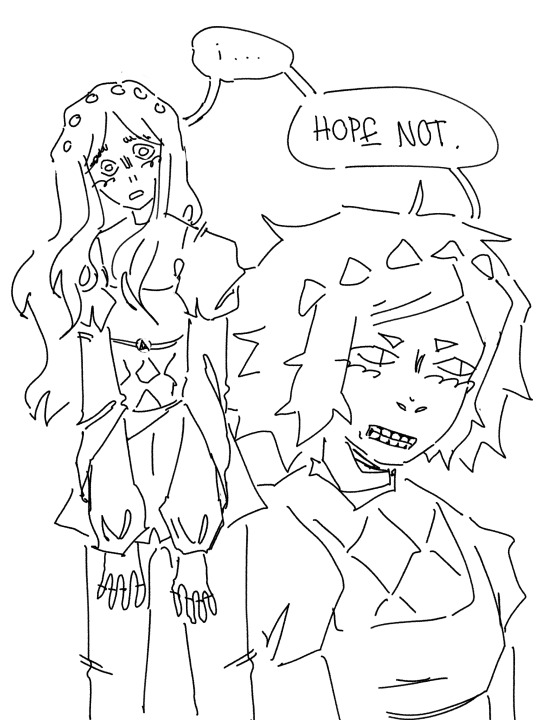
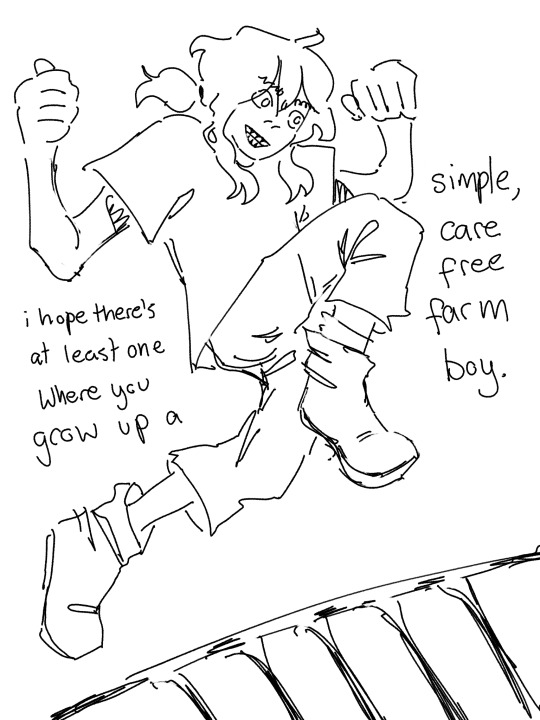

soulmates pt 1 // pt 2
#loz#botw#my art#fanart#legend of zelda#breath of the wild#totk#tears of the kingdom#zelda#link#comic
73 notes
·
View notes
Text

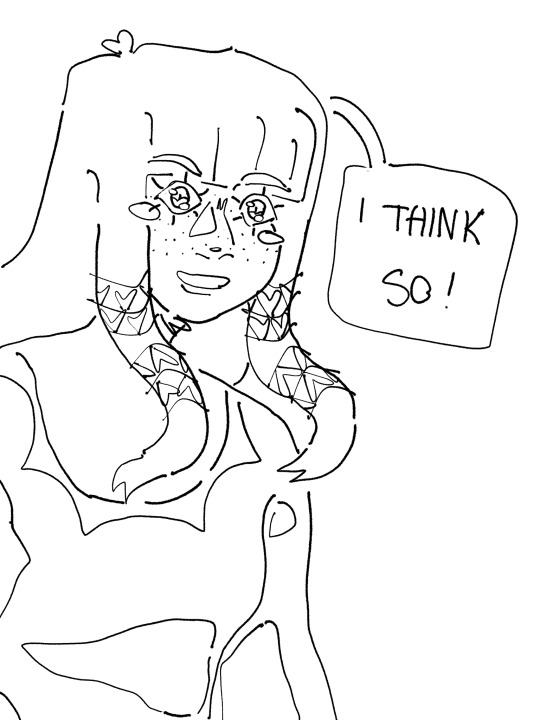
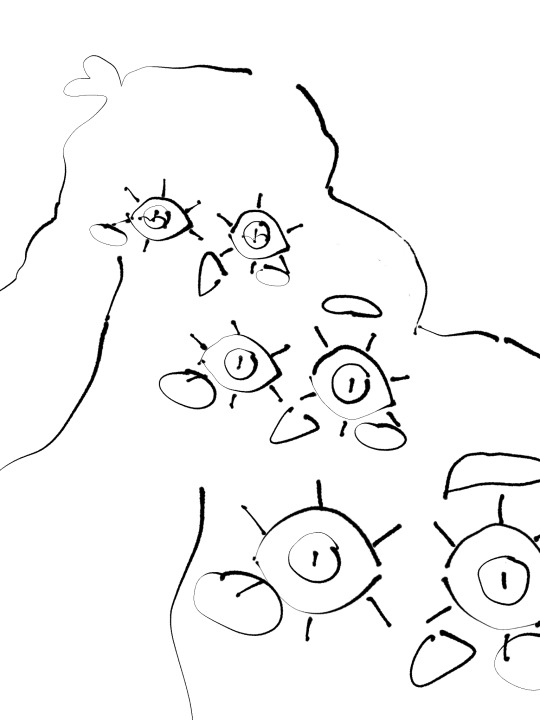




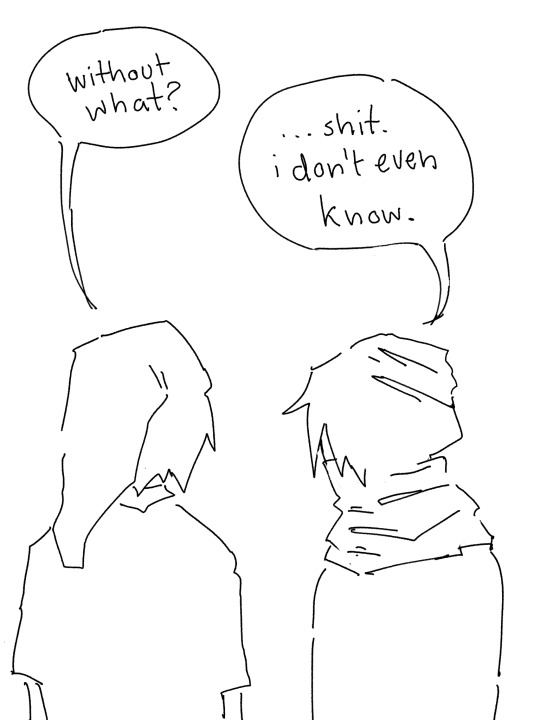


soulmates pt 1 // pt 2
#botw#legend of zelda#breath of the wild#totk#tears of the kingdom#zelda#link#skyward sword#ocarina of time#sheik#oot#sksw#comic#loz#my art#fan art
56 notes
·
View notes
Text
youtube
EXECUTION // НА УБОЙ is now available on /itch.io and Tapas!
This is a 93-page prequel comic to the Parties Are For Losers series. Please check it out!
Itch.io (ENG & RUS) - for PDF and an HD archive of all the pages
Tapas ENG - read online in English
Tapas RUS - read online in Russian
787 notes
·
View notes
Text
i think the reason dear evan hansen upsets me so much is that i legitimately feel a connection with connor, especially in the movie. the lad who played him there is highkey the best actor and singer in the whole movie, he represents the closest thing the story has to "commentary" on mental illness and its effects, but the story is fundamentally about thinking as little as possible about him as a person. the movie makes me feel sorry for him, for his family, and then some fucking guy systematically rewrites and sanitizes him into an inoffensive product.
#i think that’s is especially grim that like. in the end evans attempt at finding the ‘real’ connor is still a sanitisation#he finds out about his interests and personhood seemingly ‘outside’ his mental illness#it tries to humanise him but it’s still a sanitisation#it’s still finding the bits of him that are easy to mourn#deh poses a question (with zoey) about what it means to mourn an abusive presence#a presence that was maybe capable of growing past said abuse given the chance#but that question is never answered#the closest answer is ‘ignore the complicated parts#look at him play his guitar’#and it’s like ok. obviously it’s good to learn of him outside of his mental illness and his torment of the people around him#but the question is more complex than just what was connor beyond his negative effect on others#the question is how does one reconcile the negative impact with the fact that he was a person#it’s a question a better play would’ve put in the forefront#but instead deh pays lip service to it once#and even when it comes to an end the fundamental question isn’t addressed#it addresses only the part that evan lied and not the murphys perspective#that being that their problem wasn’t just their kid was lied about#it was the fact that they all clung onto those lies in an attempt to drown out the real negative memories of connor#the end goes yeah evan lied but here are some true bits about connor that could serve the same purpose#it doesn’t address the fact that the murphys ultimately don’t want to but have to accept#connor as a complex kid whose mental illness made him an abusive influence#but who was also a person in tandem with that#it goes yeah connor wasn’t friends with evan. instead he was all these other positive things you can cling onto because they’re true#zoeys question of how to mourn her brother is never answered#because instead the movie tells her yes. continue the thing evan lead you to do#compartmentalise the bad parts and instead remember the good kid that was hiding beneath or whatever#the only difference is that one is a lie and the other is true#connors nature as a deeply troubled kid is left under the carpet#it never addresses that central question. it never addresses connor as what he was#but instead as what he was supposedly hiding
383 notes
·
View notes
Text
most insane shit to me is that when deh was a phenomenon amongst theatre kids it wasn’t even a case of like, “bad media popular among largely uncritical teenagers”, or “people largely overlooking the flaws by projecting depth which is only ever implied in the source material” which is what often happens, because even though there were elements of both it was largely people going “what if evan and connor WERE gay”.
like, it’s insane to me how much of the story was actually ignored because if you looked up anything about this musical it was just gay teenagers making evan and connor into gay teenagers for the sake of thinking about gay teenagers. every other character scarcely had a presence among the minds of supposed fans, especially the female ones, and the actual story was seemingly barely consequential.
it’s just such a glaringly transparent look into theatre kid culture of the time, i think, where most musicals that were popular were musicals about teenagers that were available through bootlegs, and a lot of the times the quality of the actual material didn’t much matter.
like, most self-proclaimed fans of dear evan hansen didn’t actually care about dear evan hansen at the time. like, sure, there was the “was evan wrong” discourse and i’m sure most people still did actually watch the musical and probably liked the soundtrack or whatever, but when you looked at the content they produced all of those feelings were overwhelmingly overshadowed by “what if evan and connor were actually gay”.
and what’s most interesting is that most of these didn’t at all grapple with the fact that we never actually know what connor was like. most of the glimpses of connor’s real personality that we see, like the fact that he was abusive to his sister, his very serious mental illness, his propensity to be mean and explode at people, are completely ignored in favour of a weird amalgamation of evan’s perception of him and just some guy, cynical and maybe a bit depressed, but it’s not too serious. there’s another version of connor, one not made up by evan and one not truthful, and not even the one that is conceived by the weird homophobic gay jokes, and it’s the one where he’s actually gay.
like. in this musical which denies us the look at its central force, the musical which only conceals and conceals connor, the fans looked at it and concealed him more. like how evan took the misconception that he and connor were friends and built a reality he wants to be believable around it, the fans took the misconception that evan and connor were gay and built a reality they want to be believable around it. it’s reality building within reality building.
shit is WILD.
thinking about dear evan hansen again. why's it like that
#deh#my hot takes#sorry miss taxxon for rambling on your post i just have a lot of feelings about deh as a cultural phenomenon
530 notes
·
View notes